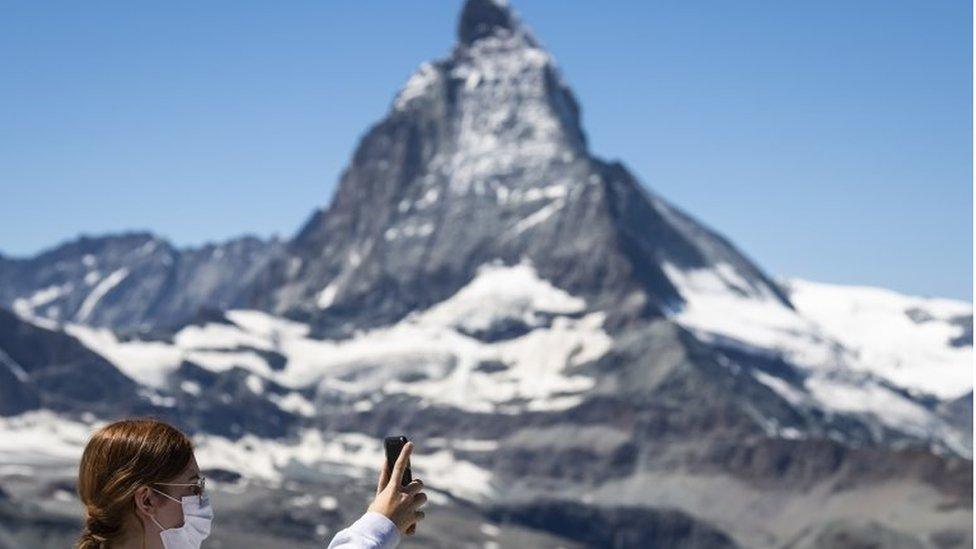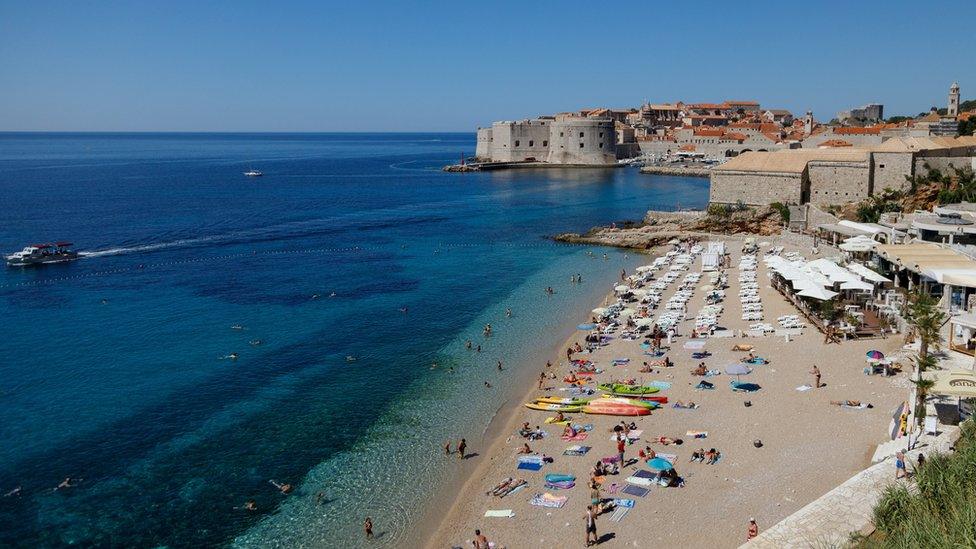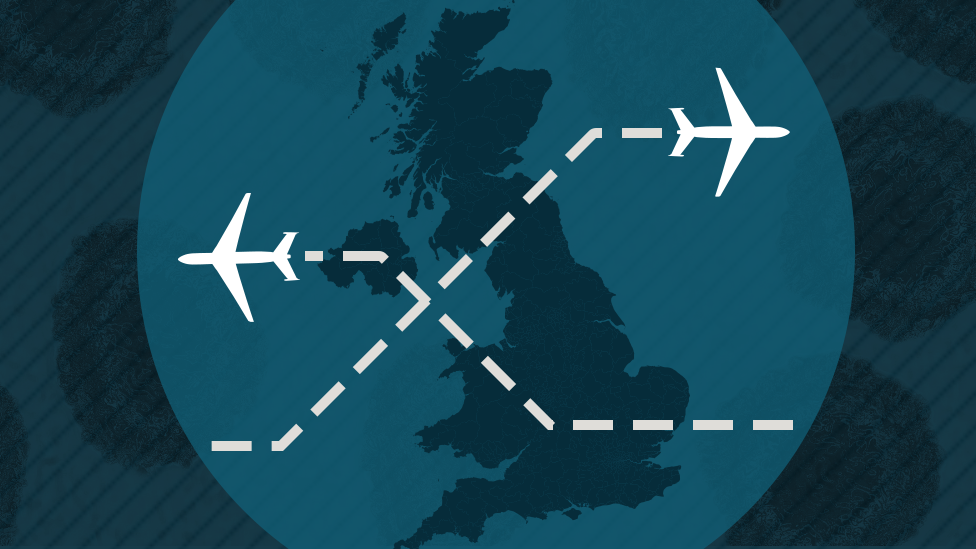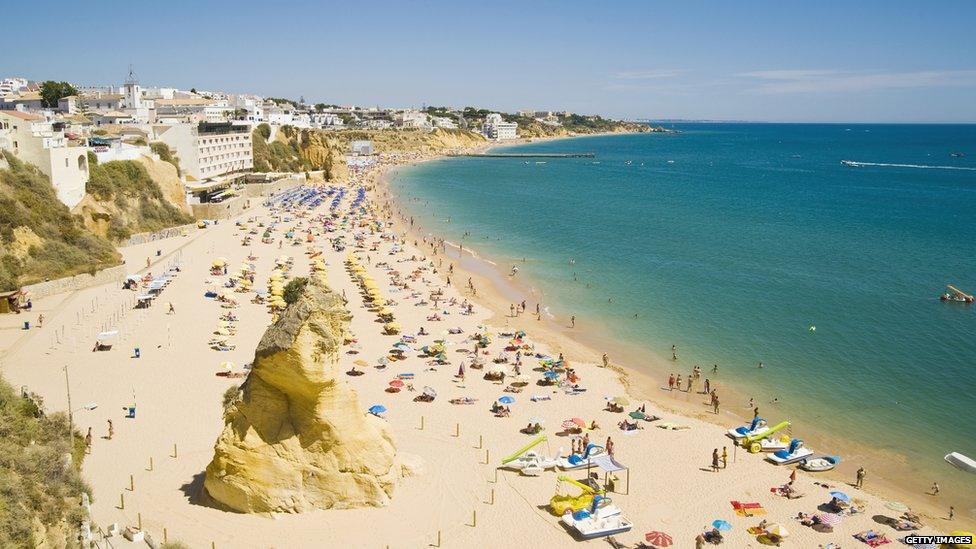Coronavirus: Switzerland travellers could face UK quarantine rules
- Published

Travellers returning to the UK from Switzerland could have to self-isolate, if the government decides to remove the country from its quarantine exemption list., external
The Czech Republic and Jamaica could also lose their exempt status, while Cuba could be added to the safe list in some parts of the UK.
UK ministers are meeting later to discuss any changes.
There is also concern about a rising number of Covid cases in Gibraltar.
However it is understood that the island has successfully lobbied to avoid being added to the quarantine measures for at least another week, says the BBC's Nick Eardley.
The requirement to quarantine for 14 days has already been applied to people coming from Switzerland to Scotland.
It follows a rise in infections in the country.
The UK considers imposing quarantine conditions when a country's rate of infection exceeds 20 cases per 100,000 people over seven days.
Switzerland is currently over that threshold, with a seven-day rate of 21.2.
Quarantine rules are set by each UK nation separately but restrictions imposed in England following the ministers' meeting are also likely to be adopted by Wales and Northern Ireland.
Swiss Tourism Federation director Barbara Gisi has said with over 1.6 million Britons travelling to the country last year, the UK is the third largest foreign market for Switzerland.
"Swiss tourism cannot afford to do without guests from abroad in the long term," she said.
Is Gibraltar next?
Speaking on BBC Radio 4's Today programme, Chief Minister of Gibraltar Fabian Picardo said cases appeared to be rising in the territory because they were doing more testing than most other places.
He said they had been "very successful at identifying cases of the virus and exercising controls in terms of imposing self-isolation".
"We have no-one in hospital, we have no-one in ICU, we have had no-one die from the virus."
He said imposing quarantine rules would be "a huge inconvenience" not just to tourists but also people travelling to Gibraltar for work and study.
But a decision on changing the island's status in unlikely to be made this week.
Allow X content?
This article contains content provided by X. We ask for your permission before anything is loaded, as they may be using cookies and other technologies. You may want to read X’s cookie policy, external and privacy policy, external before accepting. To view this content choose ‘accept and continue’.
The Department for Transport introduced the compulsory 14-day quarantine for some arrivals from overseas in early June.
In the following month, the four UK nations unveiled lists of "travel corridors", detailing countries that were exempt from the rule.
Since then the governments have regularly updated that list, adding and removing countries based on their coronavirus infection rates and how they compare with the UK.

Around 875,000 British nationals visited Croatia last year
Last week quarantine restrictions were lifted on those returning from Portugal, but added for travellers coming back from Croatia, Austria and Trinidad and Tobago.
People who do not self-isolate can be fined up to £1,000 in England, Wales and Northern Ireland, and £480 in Scotland, and there are fines up to £5,000 for persistent offenders.

WILL COVID-19 CHANGE THE WORLD OF WORK FOR GOOD?: Is working from home a long-term solution?
GROUNDED WITH LOUIS THEROUX: How did these high-profile people cope with lockdown?


How will you be affected if Switzerland goes on the quarantine list? Email haveyoursay@bbc.co.uk, external.
Please include a contact number if you are willing to speak to a BBC journalist. You can also get in touch in the following ways:
WhatsApp: +44 7756 165803
Tweet: @BBC_HaveYourSay, external
Please read our terms & conditions and privacy policy
If you are reading this page and can't see the form you will need to visit the mobile version of the BBC website to submit your question or comment or you can email us at HaveYourSay@bbc.co.uk, external. Please include your name, age and location with any submission.
- Published24 December 2020

- Published20 August 2020
